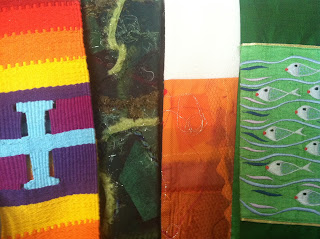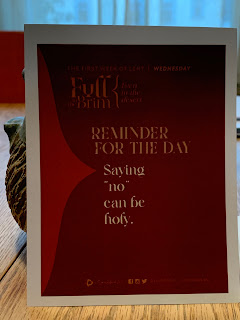 |
| Sermon Prep |
There are some gospel stories that are one-of-a-kind--the parable of the Prodigal Son comes to mind, a beloved tale that is reported only in the Gospel According to Luke. There are other gospel stories that are told over and over; there is something so essential about them, it seems the gospel wouldn't be the gospel if they were missing. The feeding of the multitudes is one such story, told six times across the four gospels. Jesus predicts his death three times in the synoptic gospels (Matthew, Mark, and Luke), and talks about it extensively in the second half of the Gospel According to John. And, of course, the crucifixion and the empty tomb are recounted in all four gospels, with varying details.
The anointing of Jesus is another such story. It is told four times, once in each gospel, providing us essentially, three versions of the story. As I prepare to preach on the version found in John's gospel, I thought I'd clarify my thoughts. Today I'll talk about the version found (with only slight differences) in the gospels of Matthew and Mark; tomorrow I will address the version found in the Gospel According to Luke, and on Saturday, I will talk about the version I'll be preaching on this Sunday, as found in the gospel as John.
Again, the versions told in Matthew and Mark are nearly identical, with only a few details changed. The setting is the same--the home of Simon the leper, in Bethany. Both passages take place during Holy Week, most likely on Wednesday. Both passages take place immediately following the news of the religious leaders plotting to kill Jesus, and immediately prior to Judas acting on his decision to betray Jesus--what textual critics call an inclusio, a kind of thematic sandwich. Betrayal is all around this story, but the story itself is about an action that is the opposite of betrayal.
Jesus is dining at Simon's home, and at some point during the evening, an unnamed woman enters. She brings with her a jar of costly ointment, and proceeds to pour it on Jesus' head.
Matthew and Mark both have the woman anointing Jesus' head (as opposed to his feet, as portrayed in Luke and John). This evokes the anointing of a king, a priest, or a prophet-- all roles associated with the ministry of Jesus and subsequent theological understanding of his role as Messiah.
Matthew includes the detail that it is Nard, a product of the spikenard plant; he also includes the detail that the woman breaks the jar open.
Immediately anger ensues. In Mark's gospel, it is attributed to "some who were there," but in Matthew, it is the disciples. Why such a waste? This ointment could have been sold for a large amount of money (Matthew: 300 denarii, about a year's wages for a day laborer). The money could have been given to the poor. Matthew has the disciples scolding the woman directly, while in Mark, the comments are all directed at Jesus.
Jesus' response is strong: Leave her alone (Matthew). Why do you trouble her? She has done a good service for me (as so strongly contrasted with the evil service cooked up by the religious leaders and Judas). Jesus identifies this anointing as preparation for his burial. As I mentioned earlier, all four gospels show Jesus predicting his passion and death. The disciples push back on his predictions (especially Peter), Only this unnamed woman acknowledges what he has predicted, and, by his interpretation of her action, ritually prepares for that moment.
A breathtaking statement ends both accounts. The goodness of the woman's action is so profound, Jesus states that it will live on in the memory of the church.
"Truly I tell you, wherever the good news is proclaimed in the whole world, what she has done will be told in remembrance of her." (Mark 14:9; Matthew 26:13)
The memory of the unnamed woman lives on.















